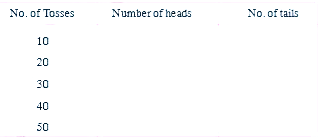Find the proudct (a−b−c)(a2+b2+c2−ab+bc−ca) without actual multiplication. Solution in Kannada
Step by step video & image solution for Find the proudct (a-b-c) (a ^(2) + b ^(2) + c ^(2) - ab + bc-ca) without actual multiplication. by Maths experts to help you in doubts & scoring excellent marks in Class 9 exams.
Updated on:21/07/2023Topper's Solved these Questions
- POLYNOMIALS AND FACTORISATION BOOK - NCERT KANNADCHAPTER - POLYNOMIALS AND FACTORISATION EXERCISE - TRY THESE
5 Videos
- POLYNOMIALS AND FACTORISATION BOOK - NCERT KANNADCHAPTER - POLYNOMIALS AND FACTORISATION EXERCISE - THINK DISCUSS AND WRITE
3 Videos
- LINES AND ANGLES BOOK - NCERT KANNADCHAPTER - LINES AND ANGLES EXERCISE - THINK, DISCUSS AND WRITE
3 Videos
- PROBABILITY BOOK - NCERT KANNADCHAPTER - PROBABILITY EXERCISE - DO THIS
3 Videos
Similar Questions
Write a polynomial with 2 terms in variable x.
View SolutionHow many terms a cubic (degree 3) polynomial with one variable can have ? Give examples.
View SolutionWhat is the difference between intersecting lines and concurrent lines ?
View SolutionToss a coin for number of times as shown in the table. And record your findings in the table.

What happens if you keep on increasing the number of tosses.
View Solutionसिद्ध कीजिए की ∣∣ ∣ ∣∣abca2b2c2bccaab∣∣ ∣ ∣∣=(a−b)(b−c)(c−a)(ab+bc+ca)
View Solutionshow that the determinant
∣∣ ∣ ∣∣a2+b2+c2bc+ca+abbc+ca+abbc+ca+aba2+b2+c2bc+ca+abbc+ca+abbc+ca+aba2+b2+c2∣∣ ∣ ∣∣
is always non- negative.
View Solutionদেখাও যে,
⎡⎢⎣bcaa2cabb2abcc2⎤⎥⎦=(a−b)(b−c)(c−a)(bc+ca+ab)
View Solutionপ্রমাণ করো যে, ∣∣ ∣ ∣∣abca2b2c2bccaab∣∣ ∣ ∣∣=(a−b)(b−c)(c−a)(ab+bc+ca)
View SolutionWithout multiplication (a-b-c)(a^(2)+b^(2)+c^(2)-ab+bc-ca) Find the result.
View SolutionFind the product (a-b-c) (a ^(2) + b ^(2) + c ^(2) - ab + bc-ca) without actual multiplication.
View SolutionFind the proudct (a−b−c)(a2+b2+c2−ab+bc−ca) without actual multiplication.
View SolutionFind the proudct (a−b−c)(a2+b2+c2−ab+bc−ca) without actual multiplication.
View SolutionFind the proudct (a−b−c)(a2+b2+c2−ab+bc−ca) without actual multiplication.
View Solutionयदि a,b,c ∈ R तब सारणिक △∣∣ ∣ ∣∣a2+b2+c2bc+ca+abbc+ca+abbc+ca+aba2+b2+c2bc+ca+abbc+ca+abbc+ca+aba2+b2+c2∣∣ ∣ ∣∣ अऋणांत्मक होगा पुनः सारणिक के शून्य होने के सार्थ बताये
View Solutionshow that the determinant
∣∣ ∣ ∣∣a2+b2+c2bc+ca+abbc+ca+abbc+ca+aba2+b2+c2bc+ca+abbc+ca+abbc+ca+aba2+b2+c2∣∣ ∣ ∣∣
is always non- negative.
View Solution
